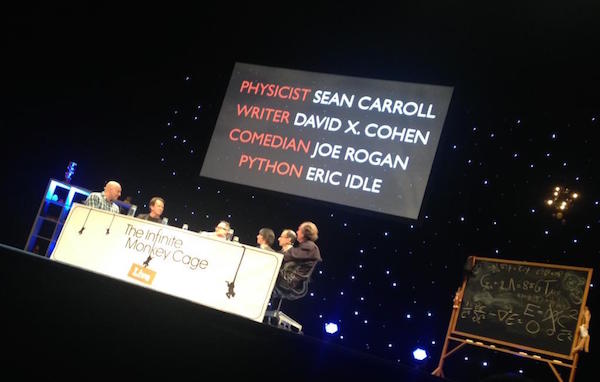The Infinite Monkey Cage is a British science/entertainment show put on by the dynamic duo of physicist Brian Cox and comedian Robin Ince. It exists as a radio program, a podcast, and an occasional live show. There are laughs, a bit of education, and some guests for the hosts to spar with. The popular-science ecosystem is a lot different in the UK than it is here in the US; scientists and science communicators can generally have a much higher profile, and a show like this can really take off.
So it was a great honor for me to appear as one of the guests when the show breezed through LA back in March. It was a terrific event, as you might guess from the other guests: comedian Joe Rogan, TV writer David X. Cohen, and one Eric Idle, who used to play in the Rutles. And now selected bits of the program can be listened to at home, courtesy of this handy podcast link, or directly on iTunes.
Be sure to check out the other stops on the IMC tour of the US, which included visits to NYC, Chicago, and San Francisco, featuring many friends-of-the-blog along the way.
These guys, of course, are heavy hitters, so you never know who is going to show up at one of these things. Their relationship with Eric Idle goes back quite a ways, and he actually composed and performed a theme song for the show (below). Naturally, since he was on stage in LA, they asked him to do a live version, which was a big hit. And there in the band, performing on ukulele for just that one song, was Jeff Lynne, of the Electric Light Orchestra. Maybe a bit under-utilized in this context, but why not get the best when you can?

I was there! It was great. It seemed like Robin tried to poke Rogan about conspiracy theories once or twice, but he didn’t bite. Saw a few celebrities in the audience as well.
Pingback: The Infinite Monkey Cage: L.A. edition « Why Evolution Is True
For the record, as far as I can tell, Jeff Lynne played all the instruments and produced it too. And you should really mention The Move. If Jeff Lynne would have been Albert Einstein, ELO would be the photoelectric effect and The Move would be GR.
How come there wasn’t a stop in Houston? Even if you figure that rightwing conservatists wouldn’t attend, there would still be enough of us left to fill-up the front row.
Lynne might have played all the instruments on the recording, but at the live show he was limited to just one.
I don’t get how all knowledge of physics could be created from an infinite monkey cage when 99% of them only ramble on about aether, which 99% of pop physics books explain to not actually exist. How could all reasonable knowledge only be contained in the 1%?
Hey Sean, this podcast raised a question when you were talking about wormholes, and travelling back in time.
Even if wormholes only are microscopic on the quantum level, how would the ability to tunnel back in time affect our notion of causality? Don’t causes have to precede effects? But wouldn’t this say effects could precede causes if a particle were able to go back in time and affect particles that came before it? Is that what the chronology protection conjecture was getting at?
Great to hear you on this podcast.
@ Jacob
I had heard that Feynman and other physicist believe that particles can have influences through time, but they wouldn’t have classified it as being wormholes. It wouldn’t have to be something like a tachyon or unknown particle either. On the quantum level time travel could act much differently than it would in the macroscopic world, among many other things. I would think that if a particle did influence its own world line or causality it could get caught in a loop of events being repeated over and over again. Then it would have to find the lowest energy level to stabilize in, much like the Mexican Hat problem described in finding the Higgs Boson. Just theory crafting here of course, but it could turn into something similar to a self-fulfilled paradox where the events that take place are the same events that where recorded in history. There would be less deviation in the events as they repeated. Therefore, overall, the world line or particle would expend less energy.
That is if there was no chronological protection. Something like the Grandfather Paradox would have a chain of events that would be impossible to transpire as a self-fulfilled paradox. For macroscopic bodies it would seem like there would have to be some type of chronological protection involved. Then some particles can occupy the same region of space at the same time while other particles cannot according to the Pauli exclusion principle.
Jacob– Wormholes, if they were to exist at all, might very well wreak havoc with our conventional notions of causality. But it might be that the probability of observing any violation of causality is much less than once in the lifetime of the universe, or (more likely, I’d say) that apparent causality violations all cancel out and everything is fine. But when we’re talking about quantum gravity, we certainly can’t just rely on our intuitions from ordinary classical spacetime.
Very interesting. Thanks!
Let’s not forget to mention the great David X. Cohen, former head writer and producer of “Futurama”, involvement in IMC.
The one on BBC radio yesterday was interesting and I think included Jerry Coyne. I was half listening in a car full of people. A bit more tentative on evolution than I expected, and they touched on ‘why sex evolved’.
Quite a stretch to me to see why two genders, attendant genitalia and associated systems, the gestation process, nurturing equipment and animal life cycles evolved in little stages for survival purposes.